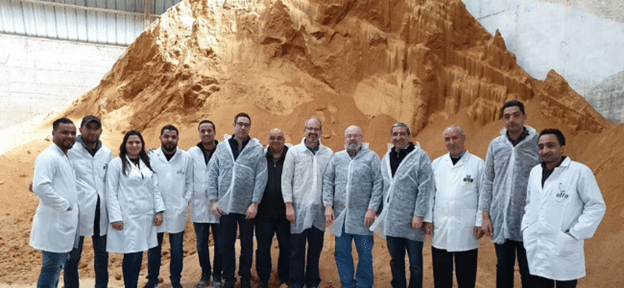This is the third in a series of stories featuring outside institutions with which the U.S. Grains Council (USGC) works to accomplish its mission of developing markets, enabling trade and improving lives.
Based on the belief that helping people acquire new skills promotes long-term relationships, the U.S. Grains Council (USGC) and Iowa State University (ISU) regularly collaborate on training and consulting projects across the globe focused on helping foreign buyers build skills in technology, marketing and processing.
“The U.S. sells quality products. We aren’t necessarily the cheapest, but we try to be the best. So, for us to offer the most value, we need to provide good customer support,” said Dr. Charles R. Hurburgh, ISU professor of agricultural biosystems engineering and professor in charge of the Iowa Grain Quality Initiative.
In early 2021, for example, ISU and USGC co-created an online training course for the feed manufacturing industry in Bangladesh that focused on different aspects of testing grains. Through the course, 27 participants learned about grain standards, testing standardization, sampling procedures, near-infrared (NIR) technology, phytosanitary hazards and export procedures. The goal of this initiative was to help Bangladeshi buyers navigate the intricacies of working with U.S. sellers and improve their testing standards for distiller’s dried grains with solubles (DDGS), which creates new opportunities for U.S. DDGS imports.
To re-establish confidence in working with, measuring and comparing U.S. grains to those grown domestically, Dr. Hurburgh also worked with the Council to help a large Mexican cattle producer review and optimize laboratory investments in its grain quality and control lab. The workshops allowed buyers to examine the advantages and disadvantages of using an external commercial lab for chemical reference data compared to creating its own reference lab to validate its NIR program.
In June, Dr. Dirk Maier, ISU professor and post-harvest engineer, helped lead 35 grain importers from Saudi Arabia, Jordan and Oman through a hybrid short course about poultry feed production and management. The virtual instruction included discussing feed manufacturing and animal nutrition and offered online visits to poultry farms, a slaughterhouse and a feed milling plant.
“Partnerships with subject-matter experts in the industry like ISU are invaluable to our programming on a global scale,” said Katy Wyatt, USGC manager of global strategies.
“As we look to support customers to address issues hindering productivity and efficiency within local livestock and feed industries, the insights these partnerships provide customers is critical, not only to tackling specific issues facing an individual company or industry as a whole, but to ultimately create more or even new opportunities for imports of U.S. coarse grains in the markets we are in.”
This collaboration is part of the mission both the Council and ISU have to create value for U.S. farmers and grains customers around the world.
“To capture value takes partnership,” Dr. Hurburgh said. “Value can be quality. It can be a service. It can be logistics. Iowa State University has made big investments in this area going forward to help create value for the U.S. agriculture system, and I think those are investments that basically touch every farmer.”
About The U.S. Grains Council
The U.S. Grains Council develops export markets for U.S. barley, corn, sorghum and related products including distiller’s dried grains with solubles (DDGS) and ethanol. With full-time presence in 28 locations, the Council operates programs in more than 50 countries and the European Union. The Council believes exports are vital to global economic development and to U.S. agriculture’s profitability. Detailed information about the Council and its programs is online at www.grains.org.

